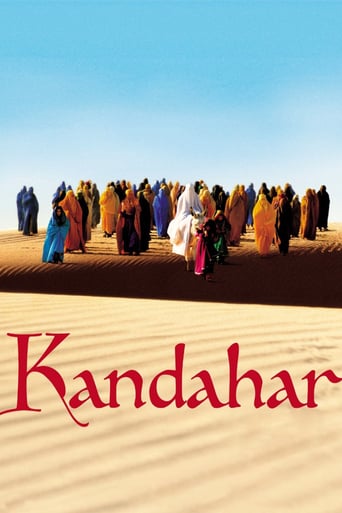Nazi_Fighter_David
The film's great success with audiences was in part due to the timing of its release, at a moment when Afghanistan had been catapulted into the headlines by the activities of the Taliban and the attacks of September 11, 2001… But the motion picture, directed by one of Iran's most prominent film artists, is much more than a story pulled out from the headlines… It stars Nelofer Pazira, a female journalist, based in Canada, playing Nafas, who is trying to get into Afghanistan to reach her sister who lives in Kandahar… Nafas's sister is threatening suicide because of the intolerable oppression of women by the Taliban… In the course of her long and dangerous journey, Nafas encounters a mixed array of Afghan people, many of them refugees… An old man agrees to take her into the country disguised as his fourth wife… Later she acquires a young boy, Khak (Sadou Teymouri), as her guide after he has been expelled from a religious school… On the way she meets Tabib Sahid, an African-American who had come to fight the Soviets but who is now practicing medicine… "Kandahar" mixes documentary authenticity with extraordinary moments of visual strangeness ad beauty… The Burka is an ever-present symbol of women's subjugation, yet underneath women wear varnished nails and lipstick, and their brightly-colored robes affirm their individuality… The film placed the suffering of the Afghan people, particularly the women, on an international stage
p_j_taylor2003
The film does have an almost documentary-like feel to it, that I think is because the main character is a journalist and she is presenting the world of Afghanistan to us. I found the film interesting, as another reviewer has put it, not in its politics but in its anthropology, it had the same fascination as watching a program on the Sky travel channel. The journalists mission, is very understated....the director held back from giving us a full on City of God oppression type of approach, but didn't, and I feel that was deliberately because he wanted us to experience the differences in culture between the Iranians and the Taliban governed Afghan side. He didn't quite pull it off for me, for two reasons....The first is I'm extremely cynical about watching any movie with a political bias, and this definitely has one. The second is, I don't think the central figure had enough charisma......Although thinking about it now, the two may have counterbalanced themselves quite well.... Anyway, it was interesting...so to was the documentary on the DVD, called Afghan alphabet. My concern about politics is illustrated nicely on that, when a young Afghan refugee, is used to show the oppression of the Taliban, because she is scared to remove her Bhurka for fear of sinning.....She is asked repeatedly what her name was, which she repeatedly said she didn't want to divulge and was clearly uncomfortable, and was in my opinion mentally bullied into removing her bhurka, which makes you wonder who is doing the oppressing now!!!
Chris Bright
This is an extremely beautiful film which inhabits a visual and emotional territory somewhere between Werner Herzog and Pasolini.As others have stated, the actors are non-professionals and the plot is not the stuff of Hollywood melodrama. However the images and sounds are haunting and profound. Mahkmalbaf is truly a poet of the cinema.The film does not attempt to make a political analysis of the situation of Afghanistan in 2001, but operates on a more humanistic and emotional level, showing the human consequences, the poverty both material and spiritual of life under the Taliban and the indifference of the outside world.The "doctor" character, far from being implausible, is played by a real person with a very similar history. He is also a stand-in within the film for Makhmalbaf himself, who started as an Islamic fundamentalist revolutionary but has moved towards a more open-minded humanism.The film itself describes a circle, the first scene is also the last, the sun shining through a burqa onto a woman's face. Between are unforgettable images, and a transit across a surreal and nightmarish landscape. Surrender yourself and you will really feel you have been on a journey.The UK DVD also includes "The Afghan Alphabet" a similarly fictionalised documentary on the struggle to bring education to the three million or so Afghan refugees in Iran.
sandoak
I was moved by the beauty brought to a situation of suffering and tragedy. As our protagonist struggles to find her sister, the horrors of postwar Afghanistan are revealed through simple encounters with a variety of people with struggles of their own. The pacing, which may seem tedious to folks used to fast action, allows a lyrical visual beauty to arise where another filmmaker may have shown chaos. In turn, this lyrical beauty creates a stillness where compassion begins and grows. What was distant & abstract becomes close & personal. We're shown a perspective on war that is at once starkly simple and deeply caring. I also enjoyed the taste of Persian culture. The legacy of Hafiz, Rumi & other great Persian poets flavors the vivid poetics of Makhmalbaf's cinematography, dialog, and plot structure. Quite a taut alternative to our American viewpoint.
